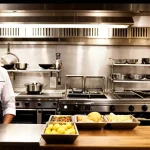Addressing Complex Regulatory Compliance in UK Kitchen Bars
Navigating the UK kitchen bar regulations is crucial for any operator aiming to run a successful establishment. The regulatory landscape involves multiple layers, including strict licensing requirements and evolving health and safety standards. Understanding these components can prevent costly delays and fines.
Licensing requirements typically cover alcohol sales, food hygiene, and entertainment permissions. Each license demands detailed documentation, often requiring operators to demonstrate compliance with local council policies and national legislation. Failure to adhere to these can lead to enforcement actions or even closure.
Also to read : Explore the cutting-edge technologies revolutionizing uk restaurant kitchens
Health and safety standards are also dynamic, responding to emerging risks such as allergen control and COVID-19 protocols. Kitchen bars must implement rigorous procedures to maintain cleanliness, staff training, and customer safety, ensuring not only legal compliance but also consumer confidence.
Mastering these regulations involves staying informed about legislative updates and engaging with local authorities. Proactively addressing compliance challenges enables kitchen bars to operate smoothly while safeguarding reputation and profitability.
In the same genre : What strategies do uk kitchen restaurants use to deliver a flawless customer experience?
Market Competition and Differentiation Strategies
Understanding the UK kitchen bar market trends is crucial for businesses aiming to thrive amid intense rivalry. Competition levels are high, driven by a growing number of kitchen bars seeking to capture consumer attention. To stand out, operators must deploy effective positioning strategies that emphasize unique selling points, such as exclusive menus, superior ambiance, or specialty drink offerings.
Branding plays a central role in establishing a competitive advantage in this crowded market. A clear, well-defined brand identity resonates with customers and helps kitchen bars differentiate themselves from rivals. For example, some establishments capitalize on local ingredients or themed interiors to create a distinctive experience that appeals to target audiences.
Staying ahead means actively adapting to emerging market trends, such as increased demand for sustainable sourcing or innovative cocktail presentations. By aligning with these shifts, kitchen bars not only attract trend-conscious consumers but also demonstrate responsiveness and agility, essential factors for long-term success in the UK kitchen bar arena.
Managing Supply Chain Disruptions
Navigating kitchen bar supply chain UK challenges requires a proactive approach to both sourcing and logistics. Domestic and global supply chain disruptions have led to delays and scarcity, especially for quality ingredients essential in kitchen bars. These disruptions stem from a combination of labor shortages, transportation bottlenecks, and fluctuating demand, all influencing availability and cost.
Sourcing issues demand careful supplier selection and contingency planning. Procuring high-quality ingredients can be complicated by international trade restrictions and price volatility. To manage costs effectively, kitchen bars in the UK often diversify suppliers and prioritize local sources where feasible, balancing quality with reliability.
Logistics challenges in the UK add another layer of complexity. Variable freight costs, customs clearance delays due to Brexit, and infrastructure limitations impact timely deliveries. Kitchen bars must optimize inventory management and maintain transparent communication with suppliers to mitigate these risks. Employing integrated supply chain software can also improve forecasting and responsiveness, ensuring consistent ingredient availability in a competitive market.
Adapting to Changing Consumer Behaviour
Consumer trends UK reveal a notable shift in expectations and dining preferences. Customers increasingly value personalized and seamless interactions that enhance their overall experience. This change demands businesses prioritize customer experience to remain relevant and competitive.
Digital transformation plays a crucial role in meeting these evolving needs. Companies are adopting innovative technologies such as mobile ordering, contactless payments, and AI-driven recommendations to engage customers more effectively. These tools not only improve convenience but also allow for tailored experiences, catering to individual preferences.
Embracing digital solutions also helps in gathering valuable data on consumer behaviour, enabling businesses to refine their strategies continuously. This proactive approach ensures alignment with the dynamic landscape of consumer trends UK and strengthens customer loyalty. Recognizing the significance of these changes, businesses investing in digital transformation are better positioned to deliver superior customer experience and sustain growth.
Staffing and Skills Shortages in Kitchen Bars
Staffing shortages in kitchen bars present a significant challenge for UK hospitality recruitment. The sector struggles to attract and retain skilled staff, largely due to intense competition and shifting workforce dynamics. Many kitchen bars face high turnover rates, impacting service quality and operational efficiency. Retaining experienced employees is crucial for maintaining smooth kitchen operations, but it requires strategic focus on employee engagement and development.
Training solutions have become essential in tackling these shortages. Upskilling employees not only improves performance but also boosts morale, promoting loyalty and reducing churn. Offering structured training programs enables kitchen bars to fill skill gaps internally, ensuring staff are equipped to handle complex tasks and customer demands.
Brexit has complicated UK hospitality recruitment further by restricting the availability of overseas workers. This reduction in labor supply has intensified the skill shortage, forcing kitchen bars to rely more heavily on local talent and invest in robust training solutions. Ultimately, addressing staffing and skills shortages demands a proactive approach combining recruitment, retention strategies, and continuous staff development.
Post-Brexit Impacts and Industry Adaptation
Brexit has brought significant Brexit effects on UK hospitality, especially affecting kitchen bars. Reduced access to EU markets has complicated supply chains, making the import of key ingredients and equipment more costly and unpredictable. This shift challenges kitchen bars to maintain product quality and pricing without compromising profit margins.
Policy changes have introduced new customs checks, VAT regulations, and labor restrictions, reducing workforce flexibility. Kitchen bars now navigate increased paperwork and delays, affecting daily operations and customer satisfaction. These challenges emphasize the importance of strategic adaptation to keep pace with evolving requirements.
To survive and thrive post-Brexit, kitchen bars have adjusted sourcing strategies, seeking domestic suppliers where possible to minimize disruption. Others have innovated by diversifying menus and focusing on local produce. Embracing new technology has also streamlined compliance with changing regulations. This proactive approach enables kitchen bars to better manage market access and remain competitive despite ongoing uncertainties.
Understanding Brexit’s impact helps kitchen bars plan effectively for sustained growth in this transformed hospitality landscape.
Potential Solutions and Success Stories
Discovering kitchen bar best practices UK offers practical answers to daily operational challenges faced by many establishments. One standout approach involves redesigning workflow to enhance efficiency and reduce bottlenecks. For example, implementing modular kitchen stations allows staff to multitask smoothly, addressing common issues like space constraints and order delays.
Industry innovation often centers on technology integration, such as adopting smart inventory systems and contactless ordering, which streamline processes and improve service speed. Such advancements not only boost productivity but also create a more pleasant experience for customers and employees alike.
Several case studies demonstrate remarkable resilience and adaptation. A London-based bar overcame staff shortages by cross-training team members, combining roles traditionally separated between kitchen and bar. This flexible staffing model balanced workload and maintained service quality during peak periods.
Expert insights highlight the importance of continuous adjustment and training to meet evolving demands. Industry leaders recommend focusing on communication improvement and leveraging data analytics to anticipate busy times, ensuring resources are appropriately allocated and enhancing overall efficiency.


